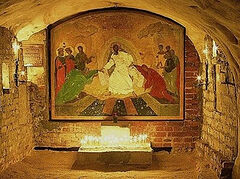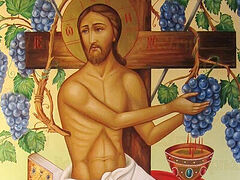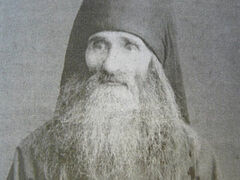 santosepulcro.co.il
santosepulcro.co.il
In His Gospel, the Lord Jesus Christ shows two paths of salvation. The Christian life in the world and the raising of children in faith and piety is one of the ways to serve God. The Lord also shows another path—a more direct path, accompanied by greater self-denial and asceticism, greater zeal; a path thanks to which those who truly traverse it offer fruit to God a hundredfold (cf. Mt. 13:8). Nevertheless he that standeth stedfast in his heart, having no necessity, but hath power over his own will, and hath so decreed in his heart that he will keep his virgin, doeth well (1 Cor. 7:37). But and if thou marry, thou hast not sinned; and if a virgin marry, she hath not sinned. Nevertheless such shall have trouble in the flesh (1 Cor. 7:28)—troubles arising from earthly cares and inevitable distractions. And the Apostle Paul commands married people not to cling to the world completely—to live so that they that have wives be as though they had none; that is, to please not your wives, but God; And they that use this world, as not abusing it (1 Cor. 7:29, 31).
The loftiness of virginity
It’s known that the flesh lusteth against the Spirit (Gal. 5:17); but when the lust of the flesh is mortified, then the spirit is pacified, and peace is established in the heart. The satisfaction of evil lust darkens the mind, hardens the heart, plunges the soul into despair, and makes a man crass and senseless. The fulfillment of lusts is the beginning of sorrows, afflictions, and sighs; from here flows the source of that evil in which the entire world lies (cf. 1 Jn. 5:19). Therefore, blessed is he who loves the virginal life: He will see the blessings of the Lord on Earth, and in this vale of tears he will find grace from God.
Virginity serves as a blessing for virgins, delivering them from the need to be subordinate to a husband and to bring forth children in pain (cf. Gen. 3:16). The Apostle Paul advises whomever seeks the ascetic life to preserve his virginity, as the best barrier from the evils of this world: I would have you be without cares… For I would that all men were even as I myself. But every man hath his proper gift of God, one after this manner, and another after that (1 Cor. 7:32, 7). Blessed is he who is not bound by the bonds of marriage, the strongest of all that this world imposes. “The celibate life,” according to St. Gregory the Theologian, “is the beginning of the future life; in it, a man, having no need of a helpmate, who inclines him towards pernicious food, devotes his private desires to God alone.”
And Scripture says: It is good for a man not to touch a woman (1 Cor. 7:1); however, All men cannot receive this saying, the Lord said, save they to whom it is given (Mt. 19:11). The Lord does not drive anyone away from Himself by presenting virginity as a high gift not obtainable for all, but rather thereby attracts lovers of Divine gifts to Him all the more. Unblemished virginity is nothing other than the angelic state, according to the Lord: The children of this world marry, and are given in marriage: But they which shall be accounted worthy to obtain that world, and the resurrection from the dead, neither marry, nor are given in marriage: Neither can they die any more: for they are equal unto the angels (Lk. 20:34-36).
 St. Stephan of Fileika. Photo: vk.com
St. Stephan of Fileika. Photo: vk.com
Virgins begin already here to be what the righteous will be in the Kingdom of Christ. They have many advantages over those who enter into marriage: They are free from worldly cares; they can always be about the one thing needful (cf. Lk. 10:42). Because their hearts have nothing to enjoy on Earth, they begin to love God more and to desire Heavenly blessings more fervently. Just as angels, who mighty in power, easily fulfill the will of the Lord, so virgins, endowed with spiritual strength, do not fear the labors of the spiritual life, sorrows, or deprivations. Therefore, St. John Chrysostom says, “Virginity can plant a good root in us from which grows all the blessings: freedom, courage, ardent zeal, fiery love for Heavenly things, and contempt for all things earthly.”
Although sometimes living in virginity can be hard for a man, because such a man has no help from a spouse and is subjected to temptation from the devil, it is on the other hand far superior to the happiest of family lives. He who has a wife and children, and rejoices in his charity to neighbors here, will not be so blessed in the future age as he who endures the deprivation of the solitary life and makes himself a “eunuch” for the sake of the Kingdom of Heaven (cf. Mt. 19:12). St. John of Karpathos speaks truly:
Never praise a layman with a wife and children who is comforted by his charity to many and suffers nothing from the demons, above a monk—do not consider yourself less than him in pleasing God. Although I don’t say that you live blamelessly in leading a celibate life; but if you do a few works, your spiritual sorrows, and sighs, and lamentations, and tears are more pleasing to God than all the blessed works of a man in the world.
Therefore, don’t praise those who lead a life in the world; and have no desire to cleave to the world.
The high dignity of virginity can be judged by the words of the divine seer: And I looked, says the Apostle John the Theologian, and, lo … an hundred forty and four thousand… And they sung as it were a new song before the throne… And no man could learn that song but the hundred and forty and four thousand, which were redeemed from the earth. These are they which were not defiled with women; for they are virgins. These are they which follow the Lamb whithersoever He goeth (Rev. 14:1–4). Virginity in this life also distinguishes those who love it from all others in body and soul: Virginal purity is manifested in them both by the quietness of their gazes and the modesty of their words; and a feeling of virginal modesty is manifested in all their eternal conduct. Whoever preserves his virginity intact, has a face that becomes fairer and a voice more pleasant.
Whoever does not want to be separated from virginity, let him hear how his wise companions lived on Earth. St. Gregory the Theologian says:
Marriage, the beginning of many burdens in life, did not bind me with its shackles. I disregarded expensive clothing and exquisite meals, which feed the fire of lust; I did not love vast beautiful chambers; I fled from the songs and poems of the lascivious. There were no scents of perfumes around me; I left silver and gold to those who love to look after treasures—their labors are great and their pleasure insignificant. My favorite food is bread and salt, and my drink—simple water. Christ, Who exalts my spirit, is all my treasure.




